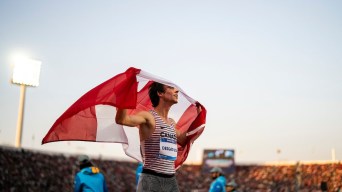COC Remembers Emil Kossev
The Canadian Olympic Committee (COC) joins the Canadian sport community in extending condolences to the family of Emil Kossev, a Team Canada performance technology specialist for both the 2008 Olympic Games and 2007 Pan American Games. His influence on many summer sport programs was invaluable.
“Emil’s area of expertise was the practical use of technology,” said Mitch Geller, high performance director of Diving Plongeon Canada. “But he also brought a palpable sense of confidence and enthusiasm. He isn’t intimated by anything other (countries) are doing, because he knows that we are doing great work too. That blend that was very important during the Olympic Games.”
Unfortunately, Emil was unable to travel to the 2008 Olympic Games. He opted to remove himself from the Beijing Team on July 14 to seek further medical treatment in Seattle for clear cell sarcoma. His long battle with cancer ended Sept. 15 when Emil passed away at the age of 42.
In his relatively short time with Canada’s Olympic teams, Emil made a tremendous impact. In October 2006, he presented at the Sport Innovation Summit in Victoria and later became involved with special projects for the rowing, canoe-kayak and diving teams. In April 2007, the COC announced that Emil would join the Road to Excellence program as a full-time expert consultant for performance technology. Emil provided much more than just feedback; he educated Olympic mission staff on how to use high performance technology and advanced video systems themselves. That is how he ensured such innovation remained practical – making it useful to even the least tech-savvy coach.
“Emil was valuable in many ways, pushing us outside our comfort zone, showing us potential opportunities in sports technology,” said Adam Parfitt, National Team Coordinator for Rowing Canada Aviron. “He came in with a can-do attitude, encouraging us to think creatively about what questions to explore. He’d say, ‘you can find this out, I can make this happen for you.’ He would help anyone who showed interest. And his attitude was contagious.”
Through his technical eye, Emil helped map strategies for improving the performance of specific athletes and teams deemed to have good chances of reaching the podium at the Games of Beijing and beyond. He brought extensive experience to the Canadian team – a decade-long member of Bulgaria’s national rowing team, he became a U.S. national rowing coach and used cutting edge technology to improve that program.
Yet, as important as his technical insight, Emil’s personality helped form a winning attitude in the sports he touched. One of the best examples is in Canadian diving – where Mitch Geller said Emil quickly became “part of the fabric” – and, specifically, veteran diver Emilie Heymans. Geller echoed Parfitt in saying that Emil came to fix things and there was no doubt they would be done.
“It isn’t just a person’s expertise; it is their personality,” Geller said. “What do they bring that inspires enthusiasm, what inspires confidence, what motivates. Our divers and coaches felt very comfortable with him.”
That included coach Yi Hua Li, who Emil taught to use video technology to bring diver Emilie Heymans to the next level. Statistics showed that Heymans had one notoriously inconsistent dive that Geller said kept her from reaching the Olympic podium in 2000 and 2004. It was the dive that begins with an armstand and explodes into a backwards triple somersault. It has a high degree of difficulty and if Heymans could improve her technique, it could make a big difference.
“We brought this to Emil,” Geller said. Heymans focused on it. With his direction, Diving Canada uncovered what separated a good dive from a poor one – a very subtle difference in Heymans’ timing.
In previous major Games, Heymans under stress was unable to tap that dive’s potential. But at the 2008 Olympic Games, she nailed it three straight times. In the finals, Geller said that dive propelled her into gold-silver territory. Heymans’ brilliant performance was good for silver, nearly halting China’s streak of diving golds.
Afterward, Hua Li said they would have to get in touch with Emil. “He’d be so happy,” she said.
In Beijing, diving (two silver medals) and rowing (1 gold, 1 silver and 2 bronze) were among Canada’s most productive sports.
Back in Seattle, even in his final days, Emil stayed focused on regaining his health and returning to help more Canadian summer sports reach the next level. Indeed, his personal calendar was booked full of projects well into 2009.



